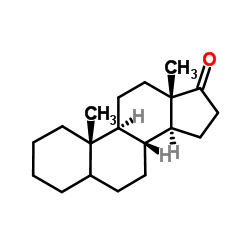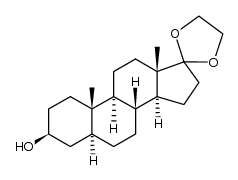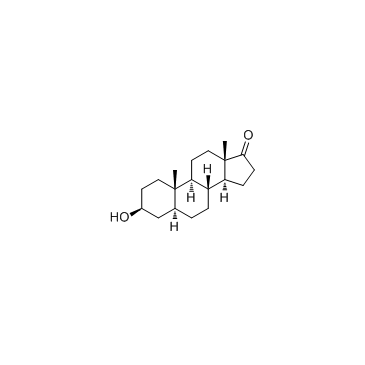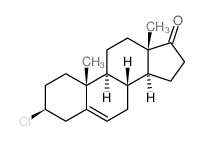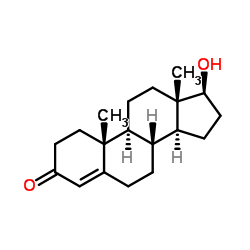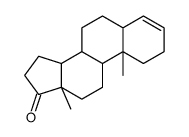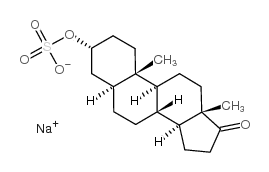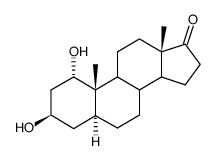53-41-8
| 中文名 | 雄酮 |
|---|---|
| 英文名 | androsterone |
| 中文别名 | 酮基化甾醇 |
| 英文别名 |
3-α-hydroxy-5α-Androstan-17-one
MFCD01317504 Androkinine 5a-Androsterone Androkinin Androtine 3alpha-Hydroxy-5alpha-androstan-17-one Atromide ICI 3-Epihydroxyetioallocholan-17-one (3a,5a)-3-Hydroxyandrostan-17-one (3α,5α)-3-Hydroxyandrostan-17-one (3R,5S,8R,9S,10S,13S,14S)-3-hydroxy-10,13-dimethyl-1,2,3,4,5,6,7,8,9,11,12,14,15,16-tetradecahydrocyclopenta[a]phenanthren-17-one 3α-hydroxy-5α-androstane-17-one Androtin 3alpha-Hydroxyetioallocholan-17-one Androstan-3a-ol-17-one 5alpha-Androsterone 3a-Hydroxyetioallocholan-17-one 5alpha-Androstane-3alpha-ol-17-one Androsterone trans-Androsterone Androstan-17-one, 3-hydroxy-, (3α,5α)- EINECS 200-173-4 Androsterone, trans- Atromide (3α,5α)-3-hydroxy-Androstan-17-one 3a-Hydroxy-5a-androstan-17-one |
| 描述 | Androsterone 是睾酮的代谢产物,可以激活法尼醇 X 受体 (FXR)。 |
|---|---|
| 相关类别 | |
| 靶点 |
Human Endogenous Metabolite |
| 体外研究 | 雄激素激活mFXR-LBD和hFXR-LBD,雄激素激活mFXR-LBD的能力强于hFXR-LBD。此外,用gal4-hFXR-LBD和SRC-1/VP16表达质粒进行的共转染研究表明,雄激素增强了SRC-1与hFXR-LBD的相互作用。包括H294S,S332V,R351H和Y361F在内的几种氨基酸变化显着降低了雄激素的活化[1]。雄激素(5α,3α-A)(10至100μM)也在体外切片模型中以浓度依赖性方式抑制癫痫样放电[2]。 |
| 体内研究 | 雄激素治疗导致小异二聚体伴侣(SHP)的显着诱导,表明雄激素可能激活内源性FXR [1]。腹腔注射雄甾酮(5α,3α-A)以剂量依赖的方式保护小鼠免受以下模型中的癫痫发作(ED50,剂量以mg/kg保护50%的动物):6 Hz电刺激(29.1),戊四唑( 43.5),毛果芸香碱(105),4-AP(215)和最大电休克(224)[2]。 |
| 细胞实验 | 使用AML-12细胞并在补充有10%胎牛血清,1%胰岛素转铁蛋白 - 硒混合物,40ng / mL地塞米松,100U / mL青霉素的DMEM / Ham's F12培养基的1:1混合物中培养,并且100μg/ mL链霉素。对于基因调控研究,将AML-12细胞以每孔4×10 5个细胞接种在生长培养基中的六孔板中。第二天,向培养基中加入包括雄甾酮或二甲基亚砜(DMSO)载体的处理。在添加处理后的不同时间,制备总RNA。单个基因的mRNA水平通过实时PCR确定[1]。 |
| 动物实验 | 在研究开始前2周,将8至10周龄的阉割雄性小鼠喂食酪蛋白饮食2周。小鼠每天皮下注射0.1mL 90%玉米油/ 10%乙醇载体或10mg / mL雄甾酮。在第五次每日治疗后2小时,在光周期开始后约4小时,杀死动物。制备总RNA,并通过实时PCR确定特定基因的mRNA水平[1]。 |
| 参考文献 |
| 密度 | 1.1±0.1 g/cm3 |
|---|---|
| 沸点 | 413.1±45.0 °C at 760 mmHg |
| 熔点 | 180-185ºC |
| 分子式 | C19H30O2 |
| 分子量 | 290.440 |
| 闪点 | 176.4±21.3 °C |
| 精确质量 | 290.224579 |
| PSA | 37.30000 |
| LogP | 3.75 |
| 外观性状 | 白色颗粒 |
| 蒸汽压 | 0.0±2.2 mmHg at 25°C |
| 折射率 | 1.536 |
| 储存条件 | 本品应密封保存。 |
| 分子结构 | 1、 摩尔折射率:83.49 2、 摩尔体积(m3/mol):267.6 3、 等张比容(90.2K):677.7 4、 表面张力(dyne/cm):41.1 5、 极化率(10-24cm3):33.10 |
| 计算化学 | 1.疏水参数计算参考值(XlogP):无 2.氢键供体数量:1 3.氢键受体数量:2 4.可旋转化学键数量:0 5.互变异构体数量:2 6.拓扑分子极性表面积37.3 7.重原子数量:21 8.表面电荷:0 9.复杂度:459 10.同位素原子数量:0 11.确定原子立构中心数量:7 12.不确定原子立构中心数量:0 13.确定化学键立构中心数量:0 14.不确定化学键立构中心数量:0 15.共价键单元数量:1 |
| 更多 | 1. 性状:白色结晶或粉末。无气味。真空中升华。不被毛地黄皂苷所沉淀。 2. 密度(g/mL,25/4℃): 未确定 3. 相对蒸汽密度(g/mL,空气=1):未确定 4. 熔点(ºC):185~185.5 5. 沸点(ºC,常压):未确定 6. 沸点(ºC,5.2kPa):未确定 7. 折射率:未确定 8. 闪点(ºC):未确定 9. 比旋光度(º):+94.6°(C=0.7,无水乙醇中)、[α]D15 +87.8°(C=1.5,二氧六环中)。 10. 自燃点或引燃温度(ºC):未确定 11. 蒸气压(kPa,25ºC):未确定 12. 饱和蒸气压(kPa,60ºC):未确定 13. 燃烧热(KJ/mol):未确定 14. 临界温度(ºC):未确定 15. 临界压力(KPa):未确定 16. 油水(辛醇/水)分配系数的对数值:未确定 17. 爆炸上限(%,V/V):未确定 18. 爆炸下限(%,V/V):未确定 19. 溶解性:溶于多数有机溶剂,不溶于水。 |
Synonym:3_-Hydroxy-5_-Androstan-17-One; Cis-Androsterone Section 2 - COMPOSITION, INFORMATION ON INGREDIENTS
Risk Phrases: None Listed. Section 3 - HAZARDS IDENTIFICATION EMERGENCY OVERVIEW
The toxicological properties of this material have not been fully investigated. Potential Health Effects Eye: May cause eye irritation. Skin: May cause skin irritation. Ingestion: May cause irritation of the digestive tract. The toxicological properties of this substance have not been fully investigated. Inhalation: May cause respiratory tract irritation. The toxicological properties of this substance have not been fully investigated. Chronic: Adverse reproductive effects have been reported in animals. Section 4 - FIRST AID MEASURES Eyes: Flush eyes with plenty of water for at least 15 minutes, occasionally lifting the upper and lower eyelids. Get medical aid. Skin: Get medical aid. Flush skin with plenty of water for at least 15 minutes while removing contaminated clothing and shoes. Wash clothing before reuse. Ingestion: Never give anything by mouth to an unconscious person. Get medical aid. Do NOT induce vomiting. If conscious and alert, rinse mouth and drink 2-4 cupfuls of milk or water. Inhalation: Remove from exposure and move to fresh air immediately. If not breathing, give artificial respiration. If breathing is difficult, give oxygen. Get medical aid. Notes to Physician: Section 5 - FIRE FIGHTING MEASURES General Information: As in any fire, wear a self-contained breathing apparatus in pressure-demand, MSHA/NIOSH (approved or equivalent), and full protective gear. During a fire, irritating and highly toxic gases may be generated by thermal decomposition or combustion. Extinguishing Media: Use agent most appropriate to extinguish fire. Use water spray, dry chemical, carbon dioxide, or appropriate foam. Section 6 - ACCIDENTAL RELEASE MEASURES General Information: Use proper personal protective equipment as indicated in Section 8. Spills/Leaks: Clean up spills immediately, observing precautions in the Protective Equipment section. Sweep up, then place into a suitable container for disposal. Avoid generating dusty conditions. Provide ventilation. Section 7 - HANDLING and STORAGE Handling: Wash thoroughly after handling. Remove contaminated clothing and wash before reuse. Use with adequate ventilation. Minimize dust generation and accumulation. Avoid contact with eyes, skin, and clothing. Keep container tightly closed. Avoid ingestion and inhalation. Storage: Store in a tightly closed container. Store in a cool, dry, well-ventilated area away from incompatible substances. Hormones and antibiotics room. Section 8 - EXPOSURE CONTROLS, PERSONAL PROTECTION Engineering Controls: Facilities storing or utilizing this material should be equipped with an eyewash facility and a safety shower. Use adequate ventilation to keep airborne concentrations low. Exposure Limits CAS# 53-41-8: Personal Protective Equipment Eyes: Wear appropriate protective eyeglasses or chemical safety goggles as described by OSHA's eye and face protection regulations in 29 CFR 1910.133 or European Standard EN166. Skin: Wear appropriate protective gloves to prevent skin exposure. Clothing: Wear appropriate protective clothing to prevent skin exposure. Respirators: A respiratory protection program that meets OSHA's 29 CFR 1910.134 and ANSI Z88.2 requirements or European Standard EN 149 must be followed whenever workplace conditions warrant respirator use. Section 9 - PHYSICAL AND CHEMICAL PROPERTIES Physical State: Granules Color: white Odor: None reported. pH: Not available. Vapor Pressure: Not available. Viscosity: Not available. Boiling Point: Not available. Freezing/Melting Point: 181.00 - 184.00 deg C Autoignition Temperature: Not applicable. Flash Point: Not applicable. Explosion Limits, lower: Not available. Explosion Limits, upper: Not available. Decomposition Temperature: Solubility in water: practically insoluble Specific Gravity/Density: Molecular Formula: C19H30O2 Molecular Weight: 290.44 Section 10 - STABILITY AND REACTIVITY Chemical Stability: Stable under normal temperatures and pressures. Conditions to Avoid: Incompatible materials, dust generation, excess heat, strong oxidants. Incompatibilities with Other Materials: Oxidizing agents. Hazardous Decomposition Products: Carbon monoxide, irritating and toxic fumes and gases, carbon dioxide. Hazardous Polymerization: Has not been reported. Section 11 - TOXICOLOGICAL INFORMATION RTECS#: CAS# 53-41-8: BV8053000 LD50/LC50: Not available. Carcinogenicity: Androsterone - Not listed by ACGIH, IARC, or NTP. Other: See actual entry in RTECS for complete information. Section 12 - ECOLOGICAL INFORMATION Section 13 - DISPOSAL CONSIDERATIONS Dispose of in a manner consistent with federal, state, and local regulations. Section 14 - TRANSPORT INFORMATION IATA Not regulated as a hazardous material. IMO Not regulated as a hazardous material. RID/ADR Not regulated as a hazardous material. Section 15 - REGULATORY INFORMATION European/International Regulations European Labeling in Accordance with EC Directives Hazard Symbols: Not available. Risk Phrases: Safety Phrases: S 24/25 Avoid contact with skin and eyes. S 28A After contact with skin, wash immediately with plenty of water. S 37 Wear suitable gloves. S 45 In case of accident or if you feel unwell, seek medical advice immediately (show the label where possible). WGK (Water Danger/Protection) CAS# 53-41-8: No information available. Canada CAS# 53-41-8 is listed on Canada's DSL List. CAS# 53-41-8 is not listed on Canada's Ingredient Disclosure List. US FEDERAL TSCA CAS# 53-41-8 is not listed on the TSCA inventory. It is for research and development use only. SECTION 16 - ADDITIONAL INFORMATION N/A |
|
毒理学数据: 1、繁殖毒性:雄性大鼠皮下TDLo:8400ug/kg,21天前交配;雌性大鼠肌内TDLo:80mg/kg,13-20天后受孕 CHEMICAL IDENTIFICATION
HEALTH HAZARD DATAACUTE TOXICITY DATA
|
| 符号 |


GHS07, GHS08 |
|---|---|
| 信号词 | Danger |
| 危害声明 | H315-H319-H334-H335 |
| 警示性声明 | P261-P305 + P351 + P338-P342 + P311 |
| 个人防护装备 | dust mask type N95 (US);Eyeshields;Faceshields;Gloves |
| 危害码 (欧洲) | Xi |
| 风险声明 (欧洲) | 36/37/38-43 |
| 安全声明 (欧洲) | 22-24/25 |
| 危险品运输编码 | 2811.0 |
| WGK德国 | 3 |
| RTECS号 | BV8053000 |
| 危险类别 | 6.1 |


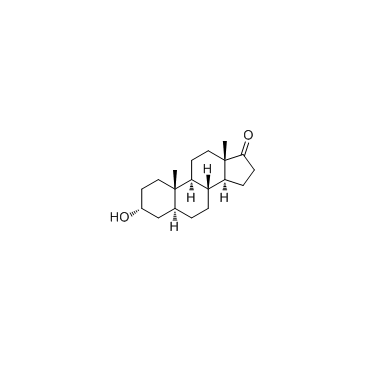

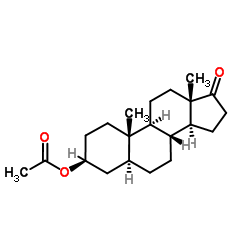
![(3R,5S,8R,9S,10S,13S,14S)-10,13-dimethyl-3-((tetrahydrofuran-2-yl)oxy)tetradecahydro-1H-cyclopenta[a]phenanthren-17(2H)-one结构式](https://image.chemsrc.com/caspic/085/111222-34-5.png)

